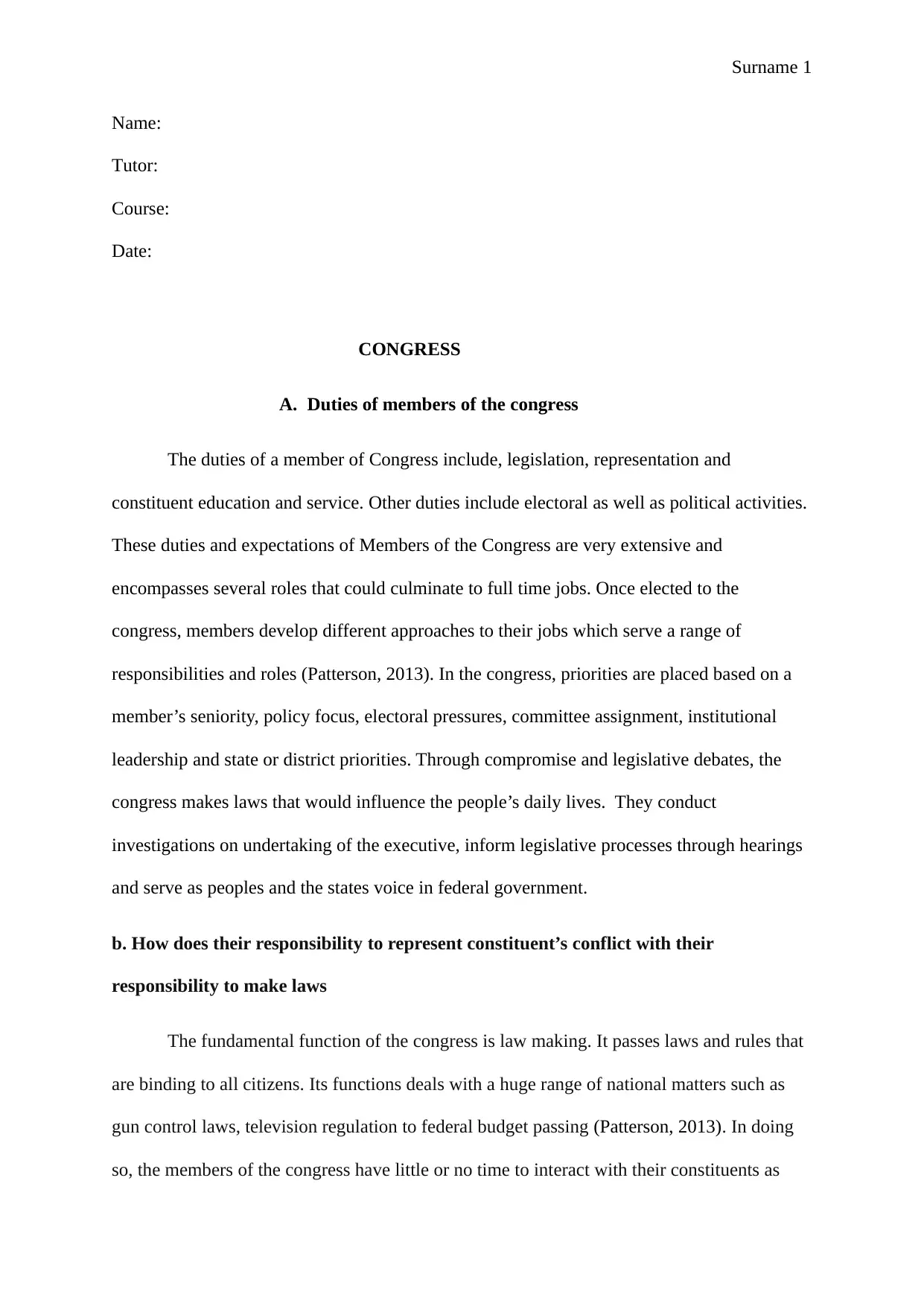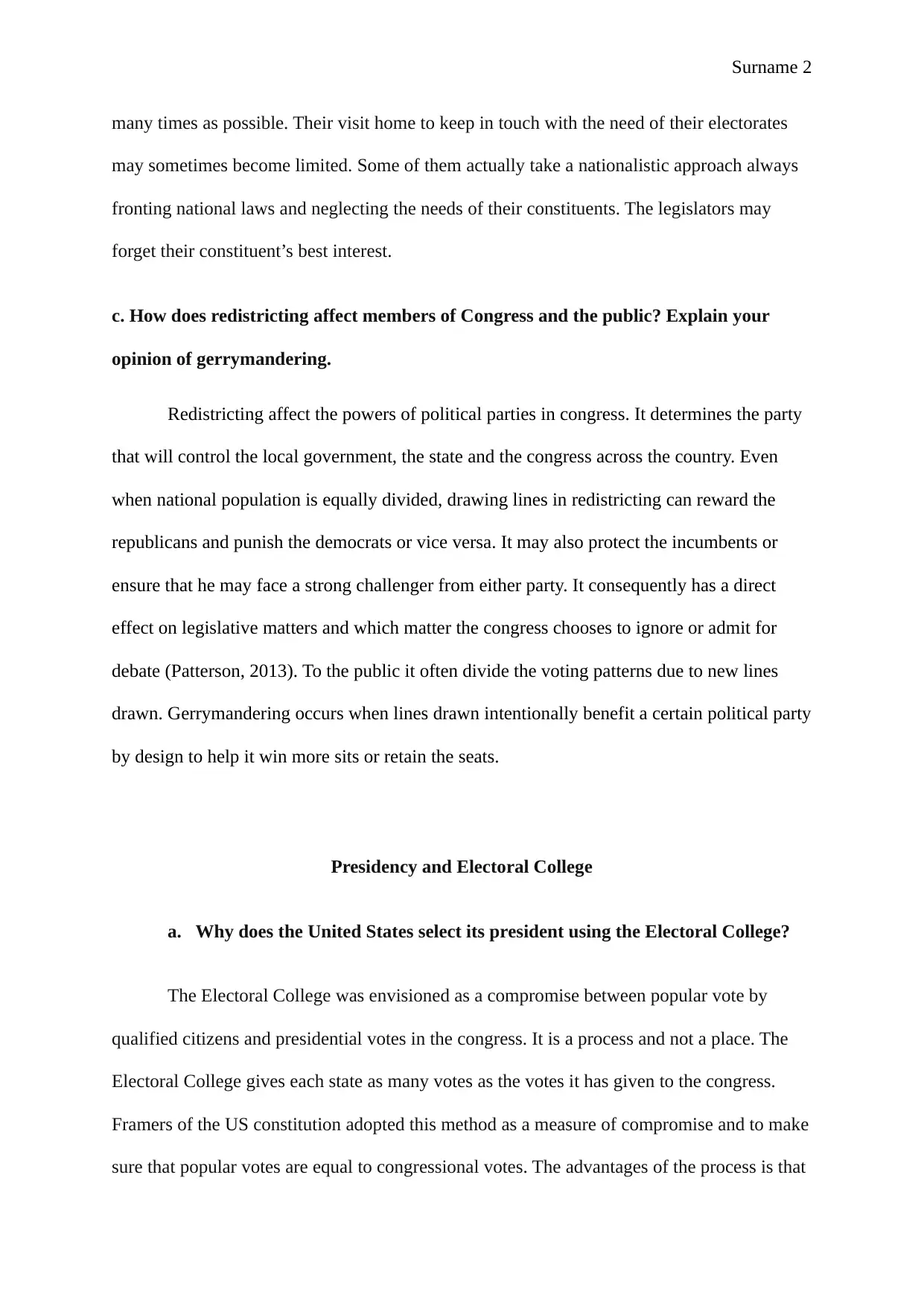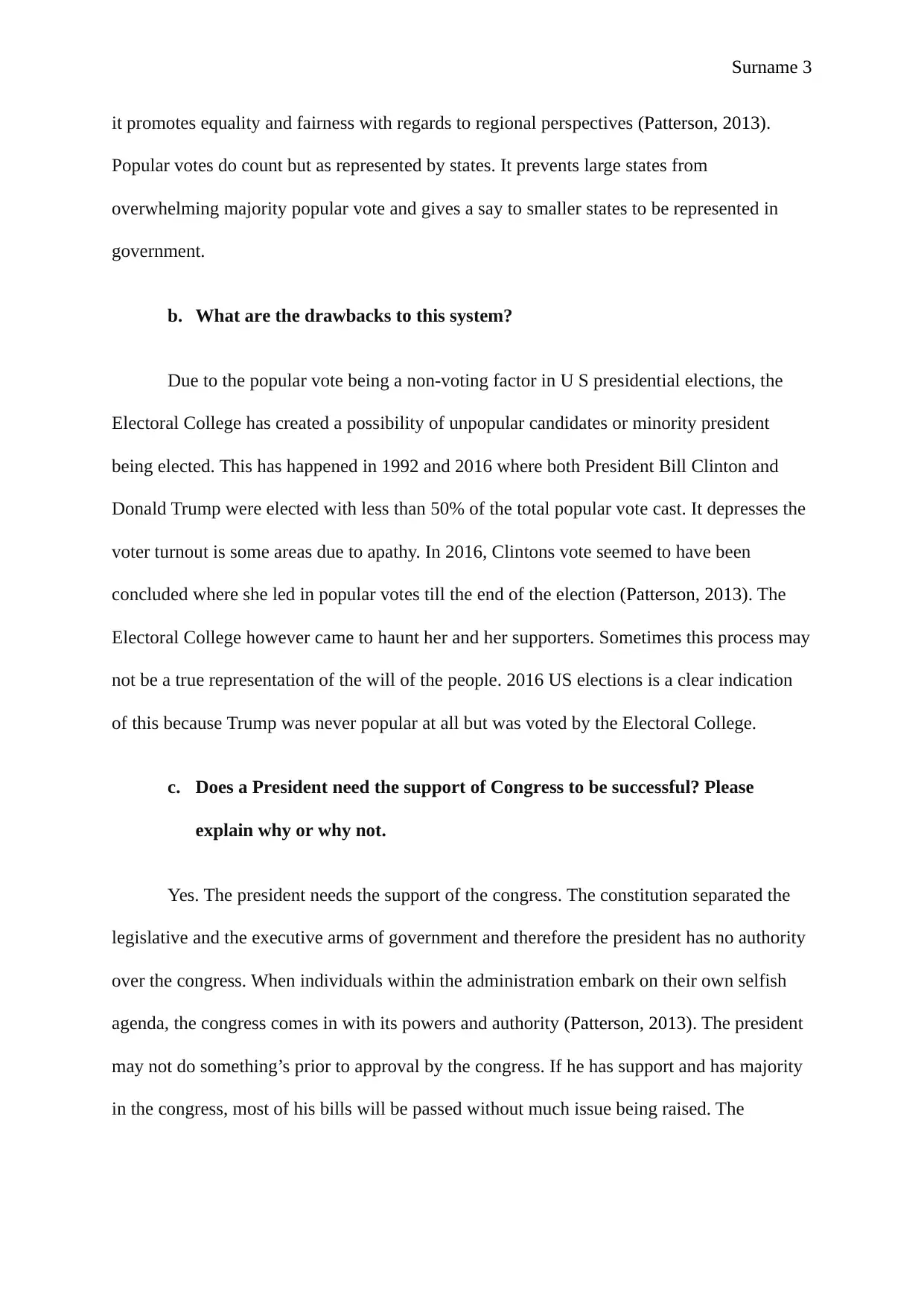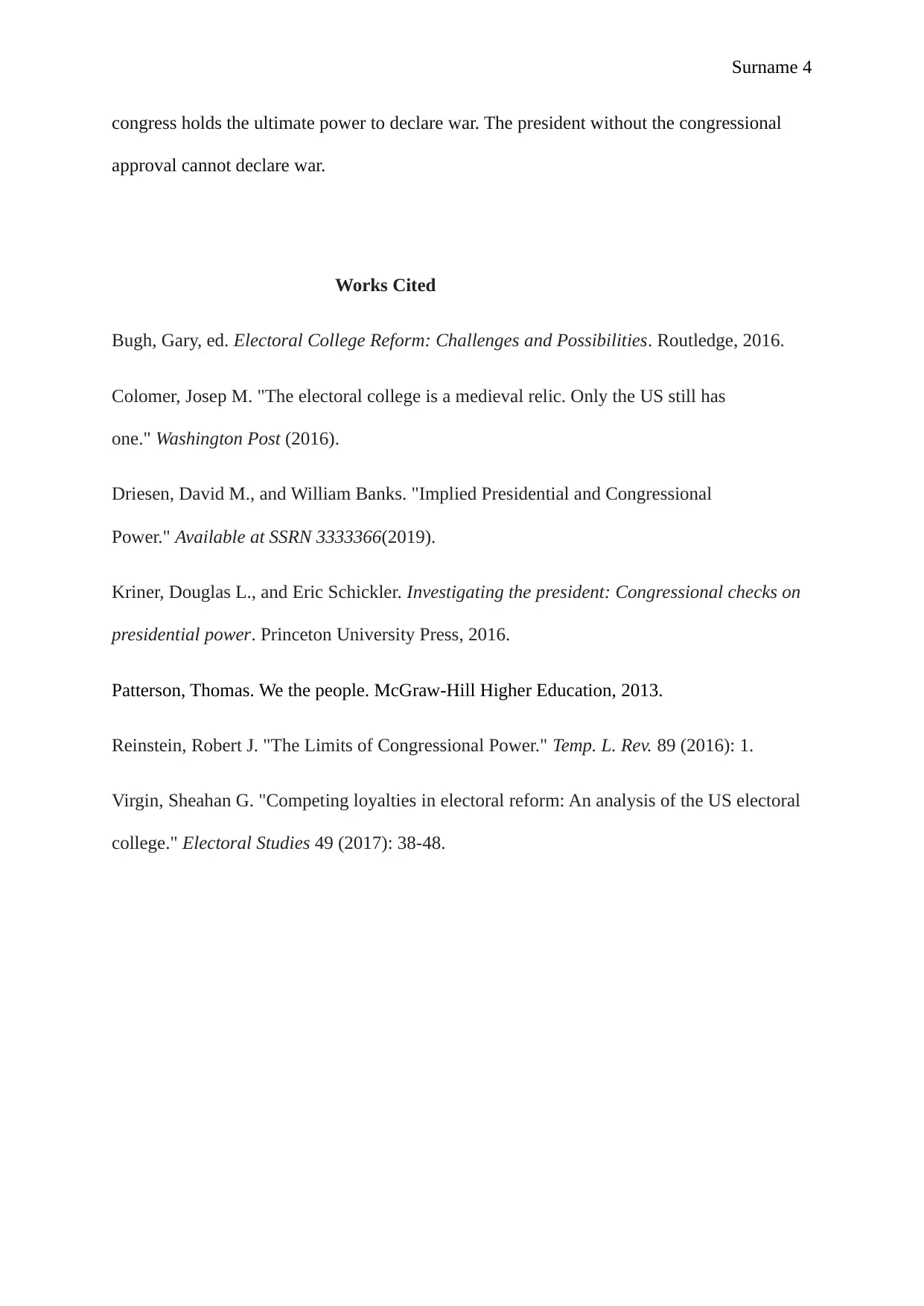Analyzing the Roles of Congress and the US Presidency
VerifiedAdded on 2023/03/31
|4
|935
|75
Homework Assignment
AI Summary
This assignment delves into the responsibilities and functions of the United States Congress and the President, examining key aspects of the American political system. It explores the duties of members of Congress, including legislation, representation, and constituent service, and analyzes how these responsibilities can conflict with lawmaking. The assignment also investigates the impact of redistricting on members of Congress and the public, with a discussion of gerrymandering. Furthermore, it examines the Electoral College, discussing its rationale, drawbacks, and the necessity of congressional support for presidential success. The document provides a comprehensive overview of these critical components of US governance, supported by cited sources.

Surname 1
Name:
Tutor:
Course:
Date:
CONGRESS
A. Duties of members of the congress
The duties of a member of Congress include, legislation, representation and
constituent education and service. Other duties include electoral as well as political activities.
These duties and expectations of Members of the Congress are very extensive and
encompasses several roles that could culminate to full time jobs. Once elected to the
congress, members develop different approaches to their jobs which serve a range of
responsibilities and roles (Patterson, 2013). In the congress, priorities are placed based on a
member’s seniority, policy focus, electoral pressures, committee assignment, institutional
leadership and state or district priorities. Through compromise and legislative debates, the
congress makes laws that would influence the people’s daily lives. They conduct
investigations on undertaking of the executive, inform legislative processes through hearings
and serve as peoples and the states voice in federal government.
b. How does their responsibility to represent constituent’s conflict with their
responsibility to make laws
The fundamental function of the congress is law making. It passes laws and rules that
are binding to all citizens. Its functions deals with a huge range of national matters such as
gun control laws, television regulation to federal budget passing (Patterson, 2013). In doing
so, the members of the congress have little or no time to interact with their constituents as
Name:
Tutor:
Course:
Date:
CONGRESS
A. Duties of members of the congress
The duties of a member of Congress include, legislation, representation and
constituent education and service. Other duties include electoral as well as political activities.
These duties and expectations of Members of the Congress are very extensive and
encompasses several roles that could culminate to full time jobs. Once elected to the
congress, members develop different approaches to their jobs which serve a range of
responsibilities and roles (Patterson, 2013). In the congress, priorities are placed based on a
member’s seniority, policy focus, electoral pressures, committee assignment, institutional
leadership and state or district priorities. Through compromise and legislative debates, the
congress makes laws that would influence the people’s daily lives. They conduct
investigations on undertaking of the executive, inform legislative processes through hearings
and serve as peoples and the states voice in federal government.
b. How does their responsibility to represent constituent’s conflict with their
responsibility to make laws
The fundamental function of the congress is law making. It passes laws and rules that
are binding to all citizens. Its functions deals with a huge range of national matters such as
gun control laws, television regulation to federal budget passing (Patterson, 2013). In doing
so, the members of the congress have little or no time to interact with their constituents as
Paraphrase This Document
Need a fresh take? Get an instant paraphrase of this document with our AI Paraphraser

Surname 2
many times as possible. Their visit home to keep in touch with the need of their electorates
may sometimes become limited. Some of them actually take a nationalistic approach always
fronting national laws and neglecting the needs of their constituents. The legislators may
forget their constituent’s best interest.
c. How does redistricting affect members of Congress and the public? Explain your
opinion of gerrymandering.
Redistricting affect the powers of political parties in congress. It determines the party
that will control the local government, the state and the congress across the country. Even
when national population is equally divided, drawing lines in redistricting can reward the
republicans and punish the democrats or vice versa. It may also protect the incumbents or
ensure that he may face a strong challenger from either party. It consequently has a direct
effect on legislative matters and which matter the congress chooses to ignore or admit for
debate (Patterson, 2013). To the public it often divide the voting patterns due to new lines
drawn. Gerrymandering occurs when lines drawn intentionally benefit a certain political party
by design to help it win more sits or retain the seats.
Presidency and Electoral College
a. Why does the United States select its president using the Electoral College?
The Electoral College was envisioned as a compromise between popular vote by
qualified citizens and presidential votes in the congress. It is a process and not a place. The
Electoral College gives each state as many votes as the votes it has given to the congress.
Framers of the US constitution adopted this method as a measure of compromise and to make
sure that popular votes are equal to congressional votes. The advantages of the process is that
many times as possible. Their visit home to keep in touch with the need of their electorates
may sometimes become limited. Some of them actually take a nationalistic approach always
fronting national laws and neglecting the needs of their constituents. The legislators may
forget their constituent’s best interest.
c. How does redistricting affect members of Congress and the public? Explain your
opinion of gerrymandering.
Redistricting affect the powers of political parties in congress. It determines the party
that will control the local government, the state and the congress across the country. Even
when national population is equally divided, drawing lines in redistricting can reward the
republicans and punish the democrats or vice versa. It may also protect the incumbents or
ensure that he may face a strong challenger from either party. It consequently has a direct
effect on legislative matters and which matter the congress chooses to ignore or admit for
debate (Patterson, 2013). To the public it often divide the voting patterns due to new lines
drawn. Gerrymandering occurs when lines drawn intentionally benefit a certain political party
by design to help it win more sits or retain the seats.
Presidency and Electoral College
a. Why does the United States select its president using the Electoral College?
The Electoral College was envisioned as a compromise between popular vote by
qualified citizens and presidential votes in the congress. It is a process and not a place. The
Electoral College gives each state as many votes as the votes it has given to the congress.
Framers of the US constitution adopted this method as a measure of compromise and to make
sure that popular votes are equal to congressional votes. The advantages of the process is that

Surname 3
it promotes equality and fairness with regards to regional perspectives (Patterson, 2013).
Popular votes do count but as represented by states. It prevents large states from
overwhelming majority popular vote and gives a say to smaller states to be represented in
government.
b. What are the drawbacks to this system?
Due to the popular vote being a non-voting factor in U S presidential elections, the
Electoral College has created a possibility of unpopular candidates or minority president
being elected. This has happened in 1992 and 2016 where both President Bill Clinton and
Donald Trump were elected with less than 50% of the total popular vote cast. It depresses the
voter turnout is some areas due to apathy. In 2016, Clintons vote seemed to have been
concluded where she led in popular votes till the end of the election (Patterson, 2013). The
Electoral College however came to haunt her and her supporters. Sometimes this process may
not be a true representation of the will of the people. 2016 US elections is a clear indication
of this because Trump was never popular at all but was voted by the Electoral College.
c. Does a President need the support of Congress to be successful? Please
explain why or why not.
Yes. The president needs the support of the congress. The constitution separated the
legislative and the executive arms of government and therefore the president has no authority
over the congress. When individuals within the administration embark on their own selfish
agenda, the congress comes in with its powers and authority (Patterson, 2013). The president
may not do something’s prior to approval by the congress. If he has support and has majority
in the congress, most of his bills will be passed without much issue being raised. The
it promotes equality and fairness with regards to regional perspectives (Patterson, 2013).
Popular votes do count but as represented by states. It prevents large states from
overwhelming majority popular vote and gives a say to smaller states to be represented in
government.
b. What are the drawbacks to this system?
Due to the popular vote being a non-voting factor in U S presidential elections, the
Electoral College has created a possibility of unpopular candidates or minority president
being elected. This has happened in 1992 and 2016 where both President Bill Clinton and
Donald Trump were elected with less than 50% of the total popular vote cast. It depresses the
voter turnout is some areas due to apathy. In 2016, Clintons vote seemed to have been
concluded where she led in popular votes till the end of the election (Patterson, 2013). The
Electoral College however came to haunt her and her supporters. Sometimes this process may
not be a true representation of the will of the people. 2016 US elections is a clear indication
of this because Trump was never popular at all but was voted by the Electoral College.
c. Does a President need the support of Congress to be successful? Please
explain why or why not.
Yes. The president needs the support of the congress. The constitution separated the
legislative and the executive arms of government and therefore the president has no authority
over the congress. When individuals within the administration embark on their own selfish
agenda, the congress comes in with its powers and authority (Patterson, 2013). The president
may not do something’s prior to approval by the congress. If he has support and has majority
in the congress, most of his bills will be passed without much issue being raised. The
⊘ This is a preview!⊘
Do you want full access?
Subscribe today to unlock all pages.

Trusted by 1+ million students worldwide

Surname 4
congress holds the ultimate power to declare war. The president without the congressional
approval cannot declare war.
Works Cited
Bugh, Gary, ed. Electoral College Reform: Challenges and Possibilities. Routledge, 2016.
Colomer, Josep M. "The electoral college is a medieval relic. Only the US still has
one." Washington Post (2016).
Driesen, David M., and William Banks. "Implied Presidential and Congressional
Power." Available at SSRN 3333366(2019).
Kriner, Douglas L., and Eric Schickler. Investigating the president: Congressional checks on
presidential power. Princeton University Press, 2016.
Patterson, Thomas. We the people. McGraw-Hill Higher Education, 2013.
Reinstein, Robert J. "The Limits of Congressional Power." Temp. L. Rev. 89 (2016): 1.
Virgin, Sheahan G. "Competing loyalties in electoral reform: An analysis of the US electoral
college." Electoral Studies 49 (2017): 38-48.
congress holds the ultimate power to declare war. The president without the congressional
approval cannot declare war.
Works Cited
Bugh, Gary, ed. Electoral College Reform: Challenges and Possibilities. Routledge, 2016.
Colomer, Josep M. "The electoral college is a medieval relic. Only the US still has
one." Washington Post (2016).
Driesen, David M., and William Banks. "Implied Presidential and Congressional
Power." Available at SSRN 3333366(2019).
Kriner, Douglas L., and Eric Schickler. Investigating the president: Congressional checks on
presidential power. Princeton University Press, 2016.
Patterson, Thomas. We the people. McGraw-Hill Higher Education, 2013.
Reinstein, Robert J. "The Limits of Congressional Power." Temp. L. Rev. 89 (2016): 1.
Virgin, Sheahan G. "Competing loyalties in electoral reform: An analysis of the US electoral
college." Electoral Studies 49 (2017): 38-48.
1 out of 4
Your All-in-One AI-Powered Toolkit for Academic Success.
+13062052269
info@desklib.com
Available 24*7 on WhatsApp / Email
![[object Object]](/_next/static/media/star-bottom.7253800d.svg)
Unlock your academic potential
Copyright © 2020–2025 A2Z Services. All Rights Reserved. Developed and managed by ZUCOL.


